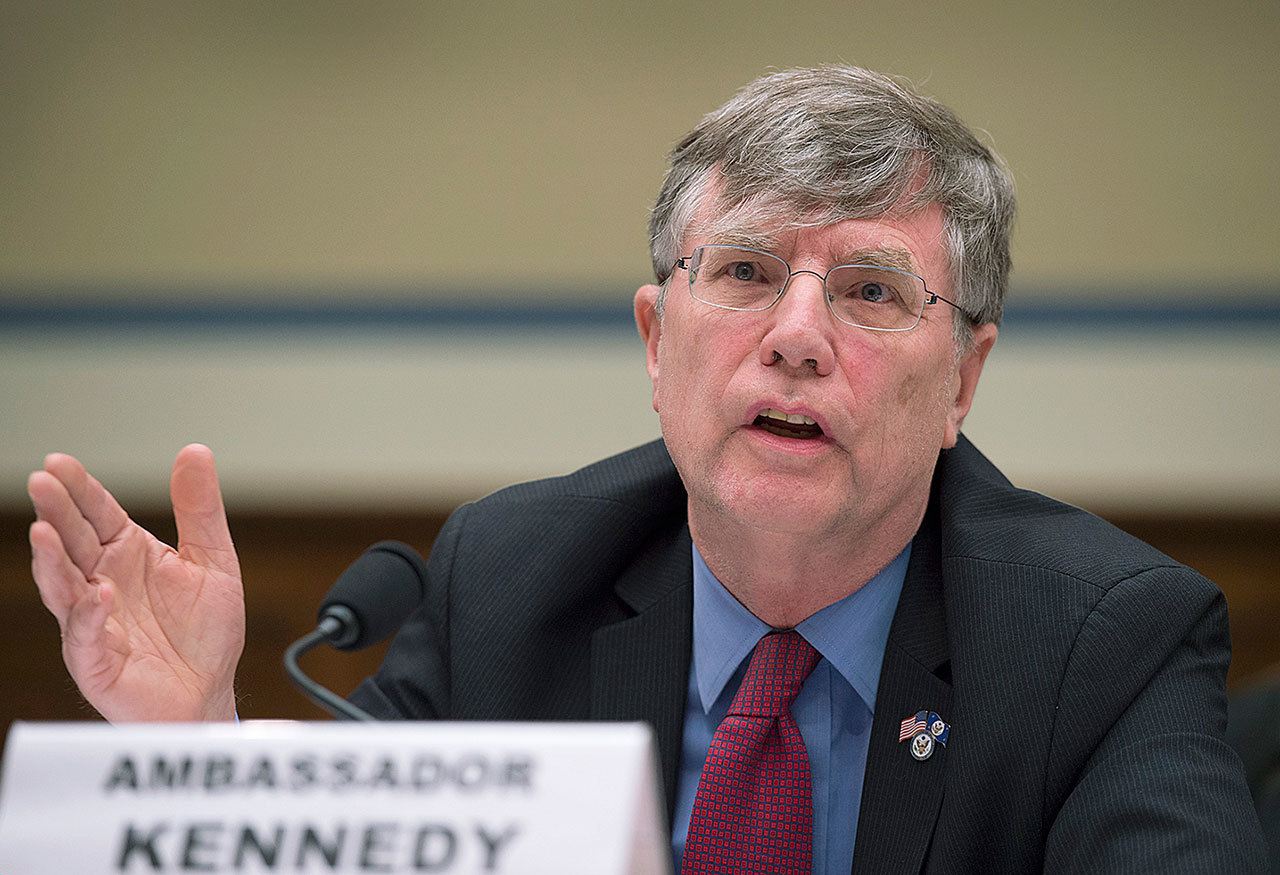By MICHAEL BIESECKER and ERIC TUCKER
Associated Press
WASHINGTON — A senior State Department official asked the FBI to help last year in reducing the classification of an email from Hillary Clinton’s private server, according to FBI investigative files made public Monday. It was to be part of a bargain that would have allowed the FBI to deploy more agents in foreign countries, according to the files.
It was not immediately clear whether the State Department official or someone at the FBI first raised the prospect of a bargain over the email’s classification.
The bureau records, citing an FBI official whose name was censored, said Undersecretary for Management Patrick F. Kennedy sought assistance in exchange for a “quid pro quo.” But the FBI’s separate statement Monday said it was the now-retired FBI official who first asked Kennedy about deploying more agents overseas.
The FBI ultimately rejected the idea, which would have allowed the State Department to archive a message related to the 2012 attacks on the U.S. diplomatic compound in Benghazi, Libya, in the basement of its Washington headquarters “never to be seen again,” according to the FBI files.
The email described reports in November 2012 that Libyan police were arresting suspects in the attack. It had been forwarded to Clinton’s private email address by Jake Sullivan, one of her top aides and the department’s director of policy planning, who was using his government email account.
Republicans quickly seized on the report as collusion within the Obama administration to protect Clinton, now the Democratic presidential nominee.
“CORRUPTION CONFIRMED: FBI confirms State Dept. offered ‘quid pro quo’ to cover up classified emails,” read a tweet from Team Trump, retweeted by the candidate.
Clinton campaign manager Brian Fallon said the campaign was not part of the discussions about email classifications.
Kennedy was a close aide to Clinton during her tenure as the nation’s top diplomat between 2009 and early 2013. He had served in his position since November 2007 under President George W. Bush.
In the FBI records, a bureau official said Kennedy “asked his assistance in altering the email’s classification in exchange for a ‘quid pro quo,’” and that in exchange, “State would reciprocate by allowing the FBI to place more agents in countries where they are presently forbidden.”
The FBI said Monday the now-retired FBI official had fielded Kennedy’s request to change the email classification and had said it would be considered if Kennedy “would address a pending, unaddressed FBI request for space for additional FBI employees assigned abroad.” The bureau said the FBI subsequently investigated the proposed arrangement but did not describe the outcome of that review.
“Although there was never a quid pro quo, these allegations were nonetheless referred to the appropriate officials for review,” the FBI said in a statement.
The State Department said Kennedy had been trying to understand the FBI’s classification decisions.
“This allegation is inaccurate and does not align with the facts,” department spokesman Mark Toner said. He added that there was never an increase in the number of FBI agents assigned to Iraq as a result of the conversations.
The disclosure was included in 100 pages the FBI released from its now-closed investigation into whether the former secretary of state and her aides mishandled sensitive government information that flowed through the private mail server located in her New York home.
According to the FBI’s account, Kennedy proposed using an obscure provision under the U.S. Freedom of Information Act to keep the existence of the secret document from becoming public, the FBI files said.
The provision cited in the FBI files, known as “B9,” is intended to protect geological and geophysical information and data, including maps, concerning wells and is the most rarely used FOIA exemption.
“Kennedy told (redacted) that the FBI’s classification of the email in question caused problems for Kennedy and Kennedy wanted to classify the document as ‘B9,’” The FBI report says. “Kennedy further stated that the ‘B9’ classification would allow him to archive the document in the basement of DoS (Department of State) never to be seen again.”
The FBI official said that after learning later that the information in question concerned the Benghazi attacks, he contacted Kennedy and told him there was “no way he could assist” with declassifying the material found in the email.
Toner suggested that Kennedy may not have raised the “B9” exemption at all, but rather “B7” — a separate exemption protecting confidential communications with law enforcement. Toner said that exemption could have still allowed parts of the document to be released.
Toner also denied there was any proposed deal, saying the FBI agent first raised the numbers of bureau personnel approved to be in Iraq at the end of the phone call as a separate issue.
“I can’t speak to what this person’s intent, whether they misunderstood the atmosphere of that conversation, I have no idea,” he said. “All I can say is that there was no quid pro quo.”
The Associated Press reported the existence of the secret Benghazi-related email in May 2015, though the classified content of the document has never been made public.
At the time, administration officials acknowledged interagency disagreements about whether certain information in the emails was classified, disagreements that the State Department said were contributing to the slow processing of their public release under the Freedom of Information Act.
House Republicans said Monday that the reports of Kennedy’s behind-the scenes maneuvering with the FBI were “extremely disturbing.”
“Those who receive classified intelligence should not barter in it — that is reckless behavior with our nation’s secrets,” said House Oversight and Government Reform Committee Chairman Jason Chaffetz, R-Utah, and House Intelligence Committee Chairman Devin Nunes, R-Calif., in a joint statement.
Chaffetz first disclosed the alleged quid pro quo in an interview with Fox News on Saturday.
Talk to us
> Give us your news tips.
> Send us a letter to the editor.
> More Herald contact information.

























